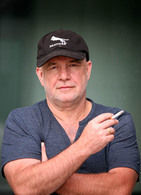Didi Danquart (born in the industrial city of Singen am Hohentwiel in 1955).
1965–1970: first visual education through (time) intensive study of the comics Sigurd, Ivanhoe, via Donald Duck to Tintin and Snowy to Bat- Super- and Spiderman with grandmother at the newsagents. Now a recognised science: tintinology.
From 1978: co-founder of “Medienwerkstatt Freiburg”.
Consequently created engaged political, countercultural work using newly emerging analogue video technology and autodidactic film/education with a focus on documentary film.
From 1983 to 1991, full-time filmmaker in the collective. In this period, realisation of over 20 long documentary films, mainly in West Germany, South and Middle America, as well as increasingly in East Europe and the Balkans.
The award-winning cinema-essay film about the Nazi’s filmic euthanasia propaganda Der Pannwitzblick—the first under his own authorship—was produced in 1992 and the anti-war film Wundbrand (with author and cameraman Johann Feindt)—in besieged Sarajevo—was released at the 24th Internationalen Forum des jungen Films a year later.
Danquart produced his feature film debut, the Black Forest farce Bohai Bohau, in 1995.
This was followed in 1999 by the filming of the play Viehjud Levi by Thomas Strittmatter, with which he made his international breakthrough and won, among others, the Caligari Film Prize at the Berlinale, as well as the Mayor’s Prize at Jerusalem Film Festival.
Viehjud Levi, together with Offset (2006 in Bucharest/Romania) and Bittere Kirschen (2011 in Oswiciem/Poland) form a filmic trilogy, under the title “Deutsche Conditio Humana I – III”, which—alongside the two documentary films—form the core of his oeuvre thus far.
From 2001 to 2007 he taught “artistic film” full-time at the Karlsruhe University of Arts and Design (HfG).
Didi Danquart has been a professor of feature film/directing at the Academy of Media Arts (KHM) in Cologne since 2009.
Danquart has returned to the stage time and again over the course of his creative career in order to research interaction with actors and their methods (tools) in (mostly political) productions, as well as to test the impacts of acting in three-dimensional space (e.g.: 2001 Beast on the moon by R. Kalinofski about the Armenian Genocide; 2003 Vermummte by Ilan Hatsor about the Palestine–Israel civil war and 2014 Die Antrittvorlesung about Romance scholar and hermeneutist Hans-Robert Jauss’s time in the SS). He most recently staged Of Mice and Men by John Steinbeck in his own, modernised version, relocating the action to Germany and the labour migration (Gastarbeiter) of the 1960s, at Theater Konstanz in 2018.
Through his work at the KHM he has increasingly returned to the “sub-genre” of television acting. In 2012 he shot the chamber piece thriller Das Letzte Wort (with Thomas Thieme and Shenja Lacher) and 2015/16 the philosophical “pulp story” Goster, in which he made an active intervention in the diegesis of the material, and thus worked with drawn comics as a filmic genre.
In Goster, as in all of his artistic films, he worked predominantly with stage actors (Bruno Cathomas and Julia Riedler), with whom he has continued to develop his self-formulated aesthetic style of “theatrical realism” over the last 20 years.




